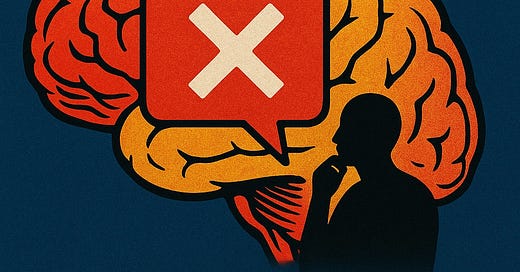🧠 Let’s Talk About the MIT Study: Without the Hype
MIT’s recent study on ChatGPT and cognitive load triggered a wave of sensational headlines, with phrases like “AI is eroding our brains” making the rounds. But does the actual science support this kind of panic? It’s time to separate the data from the drama.
The study involved a small group of participants performing short writing tasks. Yet from this, some have drawn sweeping conclusions like “ChatGPT is making us dumber.” That’s a textbook case of hasty generalisation: extrapolating broad claims from limited, early stage evidence. The leap becomes even more problematic when the argument goes like this:
“Participants using ChatGPT performed worse on certain tasks, therefore ChatGPT is damaging the brain.”
That’s not logically sound. It mistakes correlation for causation, and worse it draws a neurological conclusion from a behavioural observation.
In other words, people may engage differently with AI but that doesn’t mean their brains are deteriorating and reduced mental effort during a writing task doesn’t equal long term cognitive harm.
When a narrow observation becomes the basis for a sweeping claim especially one involving the brain or society without robust, causal evidence, we’re not just generalising. We’re arriving at a conclusion that’s not even answering the right question.
That’s the heart of the issue here:
• It’s a hasty generalisation,
• Possibly paired with an irrelevant conclusion. It argues one thing and concludes another: a classic ignoratio elenchi.
It’s like testing someone’s memory after using Google Maps once and concluding GPS causes memory loss. (How??? Explain to me like a 5 year old)
Yes, MIT is a prestigious institution. But even high profile research deserves scrutiny especially when it risks reshaping public narratives around tools as widely used as ChatGPT or other LLM apps in a negative way.
🧠 Lower Activity Isn’t Always Bad
Let’s flip the lens: reduced activity could mean efficiency. AI, like calculators or autocorrect, might allow us to redirect cognitive effort elsewhere. That’s not inherently negative, it’s evolution in how we think.
let’s not confuse lower effort with lower intelligence.
The real question is: What are we doing with the cognitive space AI frees up? That’s the conversation worth having.
🧭 Maybe we should Be Curious: Not Alarmist
In all fairness, the lead author has publicly pushed back on alarmist interpretations, cautioning that the study does not prove AI is harming brains. Yet the title and structure of the paper leave room for exactly that interpretation.
The research gives room for more important conversations about AI and cognitive effort that’s valuable. But those questions should be explored with rigour, humility, and nuance not the hundreds fear driven headlines and millions of mixed reactions that it has generated on social media and mainstream media.
We need more research, not more panic. In a field where hype moves faster than nuance, we need just more than technical novelty, we need interpretive responsibility.
TO round it up 🆙:
The paper opens a valuable window into understanding the cognitive trade offs of AI assistance or AI tools. But it also risks becoming a case study in overreach both in its framing and in how it’s been received my the general public especially the AI’s doomsday prophets.
Let’s not confuse:
• Reduced brain activity with reduced brain ability.
• Short term offloading with long term erosion.
• Small sample insight with societal truth.
AI is reshaping how we think and that much is clear. But before we claim it’s “eroding” the brain, we need far more evidence and far less haste.
But heyyyy, what do I know????
educate me I want to learn from you
Remember to criticise constructively…



